The Military’s Myth of Black Freedom
Share
Explore Our Galleries
Breaking News!
Today's news and culture by Black and other reporters in the Black and mainstream media.
Ways to Support ABHM?
By Nicole G. Young, Yes Magazine

“Black people, we were never patriots; we were pragmatists,” a friend said to me recently when we talked about both of our grandfathers’ years of military service and their reverberating effects in our lives. In a lot of ways I agree with her. While class mobility certainly drives many Black people into the military, it would be disingenuous to claim our participation is purely mercenary. The United States military promises Black people stability via economic security. However, there is an implied second promise: that through military service, Black people can access honor in our daily lives, in a country that does not treat us honorably as the default. But decades of Black participation in the U.S. military have highlighted the ways that this country has never intended to make good on either of these promises.
[…]
The military also assured recruits that they would be making their country and the world safer by signing up. This is precisely what motivated Kyle Bibby, interim chief of campaigns and programs at Color of Change and a former Marine Corps infantry captain, to enlist. For Bibby, who grew up in New Jersey, the events of Sept. 11, 2001, felt way too close to home. “We lived right next to a train station where people every day commuted in and out of the city into lower Manhattan and Midtown. There are people I knew who, for that day, had no idea where their parents were. And my way of coping with the fear was really trying to find some level of control.”
Bibby thought he “found control through joining the military.” But, “You learn very quickly, you are not in control in the military.” Bibby learned firsthand upon enrolling at the Naval Academy that talk of meritocracy and rhetoric about earning your place through honorable service had its limits—especially for Black people.
It’s a sentiment that is echoed over and over again in Black veterans’ accounts of their experiences in the military. Despite the military becoming the first major U.S. institution to desegregate in 1948, the racism Black soldiers face and their inability to achieve the rank of their white peers is well documented. So too is the mistreatment of Black veterans when they return to the U.S. from military tours.
This is in part why Bibby cofounded the Black Veterans Project, alongside fellow veterans Daniele Anderson and Richard Brookshire. Brookshire, the organization’s CEO, views his advocacy on behalf of other Black veterans, at its core, as reparations work. “It is essentially trying to build out a framework for reparative justice looking at the history of benefits obstruction that Black vets have faced historically.” To Brookshire and the Veterans Legal Services Clinic at Yale Law School’s calculations, Black veterans are owed big—to the tune of billions of dollars—for decades of disability-benefits denials based on race.
Despite racial discrimination during and after their service, Black people are overrepresented in the military—a fact that pushed Dr. Nikhil Pal Singh, professor of social and cultural analysis and history at New York University, to pursue his current study of race, militarization, and policing. He wants to understand Black people’s overwhelming presence in prisons and the military, which he calls “two of the most violent institutions in American life.”
Singh’s work highlights the inextricable links between U.S. militarism abroad and the overpolicing and incarceration of Black Americans at home. According to Singh, “Throughout U.S. history, militarism and racism have augmented one another in a tightly bound reciprocity.” And even if the U.S. military and local police forces are racially diverse, Singh contends that they “function in certain ways [in which] it doesn’t really matter who the personnel are.” He sees them as operating with a “kind of supremacism, a kind of impunity, a kind of ability to enforce racial order that now enlists significant numbers of people of color to do it.”
Black veterans are also denied benefits more frequently than others.









Comments Are Welcome
Note: We moderate submissions in order to create a space for meaningful dialogue, a space where museum visitors – adults and youth –– can exchange informed, thoughtful, and relevant comments that add value to our exhibits.
Racial slurs, personal attacks, obscenity, profanity, and SHOUTING do not meet the above standard. Such comments are posted in the exhibit Hateful Speech. Commercial promotions, impersonations, and incoherent comments likewise fail to meet our goals, so will not be posted. Submissions longer than 120 words will be shortened.
See our full Comments Policy here.